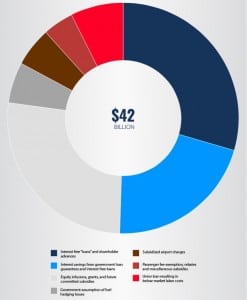U.S. Airlines Reveal Evidence They Say Proves Gulf Carriers Get Unfair Subsidies

Skift Take
Delta Air Lines, American Airlines Group, and United Airlines released their much-anticipated report providing what they say is proof that the Gulf carriers have received $42 billion in "quantifiable subsidies" from their governments, enabling them to jumpstart their growth and distort the competitive marketplace.
"Most significantly, while they have long denied that they are subsidized, newly obtained evidence demonstrates that the Gulf carriers have collectively received over $40 billion in subsidies and other unfair advantages in the last decade alone," the report, "Restoring Open Skies," states. "The subsidies are fueling a massive expansion in the Gulf carriers’ fleets -- and, in the case of Etihad and Qatar, their continued existence -- and seriously distorting the commercial marketplace to the detriment of U.S. and third-country airlines."
Here's a breakdown of the governmental subsidies to the three Gulf carriers that the trio of U.S. carriers say they uncovered:
Qatar Airways
- $8.4 billion in government “loans” and “shareholder advances” with no obligation to have to repay them;
- 6.8 billion in subsidies from government loan guarantees;
- $616 million in airport fee exemptions and rebates, and
- $452 million in free land.
Etihad Airways
- $6.6 billion in government “loans” with no repayment obligation;
- $6.3 billion in government capital injections;
- $3.5 billion in additional undisclosed government funding in 2014, and
- $751 million in government grants $501 million in airport fee exemptions.
Emirates
- Unquantified subsidies from purchases of more than $11 billion in goods and services from other government-owned companies at not-at-arm’s-length prices;
- $2.4 billion from government assumption of fuel hedging losses, and
- $2.3 billion from subsidized airport infrastructure.
"These massive subsidies have enabled Qatar, Etihad and Emirates to rapidly expand their fleets and international routes, distorting the commercial aviation marketplace and diverting global traffic to their hubs," the report states. "In fact, these carriers are expected to grow capacity at more than three times the growth rate in global GDP (a key indicator for the anticipated growth in global demand) between 2012-2020."
In addition to the governmental subsidies, the report claims that the three airlines save several billion dollars annually because of their governments' ban on labor unions.
The reports exhibits section goes into great detail about the financial condition of each of the three Gulf carriers, noting that Etihad, for example, has incurred losses every year from 2004 to 2013.
"To put it plainly, the available public information provides compelling evidence that without subsidies and government guarantees, Etihad would not be in existence," the report states.
Tim Clark, CEO of Emirates, told Skift today: "“We have only just got a copy of the white paper prepared by Delta, United, and American, which to date has been presented only to select officials and journalists. We will provide a response when we’ve had the opportunity to fully review the allegations. We are confident that any allegation that Emirates has been subsidised is totally without grounds.”
Similarly, an Etihad spokesperson said: "“We will provide a comment after we have had time to properly review and respond to the claims made within the report.”





